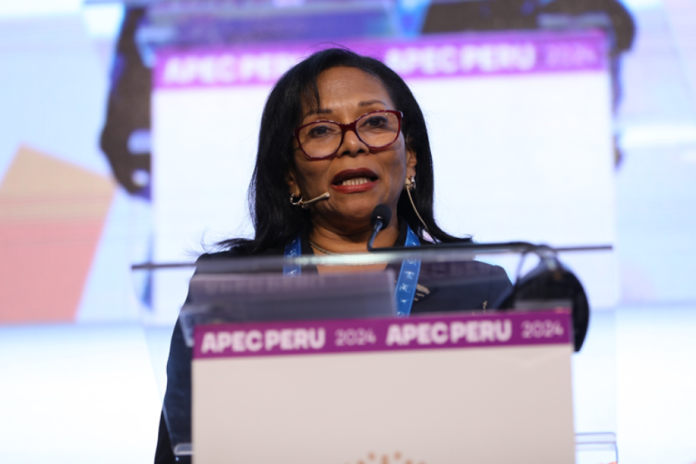By the Policy Partnership on Women and the Economy
AREQUIPA, Peru – “If women are not included, our economies will lose the potential of almost 50 percent of its population,” said Angela Teresa Hernandez Cajo, Peru’s minister of women and vulnerable populations, as she opened a public-private sector dialogue on championing women’s economic empowerment in Arequipa on Wednesday. The dialogue focused on the financial inclusion of women as a pillar of economic development as well as the role of technology in reducing and eliminating violence against women.
In her remarks, minister Hernandez explained that although financial inclusion is a powerful tool that can transform lives and promote equality and economic growth, only two out of ten women in Latin America are fully included in the financial system.
“We have a lot to do. There are still laws in several of our economies that require women to seek permission from their spouses to work or ask for their signature to access the financial market,” said minister Hernandez.
According to the APEC Women and the Economy Dashboard, only nine economies have laws that prohibit discrimination in access to credit by creditors on the basis of sex or gender.
“When they manage to access credit, the amounts usually do not meet their financial needs, because they can hardly demonstrate properties or significant or sustained incomes to support their requests. Starting, expanding, strengthening and formalizing businesses prove to be complex challenges and difficult to access for women,” minister Hernandez added. “Barriers persist that hinder equal participation of women in economic growth. Thus, they dedicate more hours to unpaid care work than their male counterparts without services that allow them to join paid work.”
Minister Hernandez highlighted, that the financial system plays a crucial role as financial inclusion generates a substantial increase in women’s economic participation, both through their companies and ventures, as well as through occupying decision-making positions and leading productive and commercial processes of broad impact in member economies.
“It is not possible to achieve sustainable development if women are excluded because society assumes that they must postpone their expectations and plans to assume the burden of care as an exclusive responsibility of theirs,” expressed minister Hernandez
Experts at the dialogue also discussed the role of technology and innovation to prevent violence against women and girls, sharing best practices and examples on the use of artificial intelligence and policies that promote violence-free environment, as well as fostering public-private partnership to advance these efforts.
“The use of technological tools can introduce risks and produce negative impacts on the population and businesses, which demands sustained preventive actions. Peru has various experiences in which technology and the internet are used to prevent acts of violence,” said minister Hernandez. “We are here not just as participants, but as an active part of an alliance that commits us to forge a future of economic empowerment for women and their greater integration into the Asia-Pacific economy – where equality is consolidated as a tangible reality that positively changes the lives of women, their families and therefore, our economies and societies,” minister Hernandez concluded.





